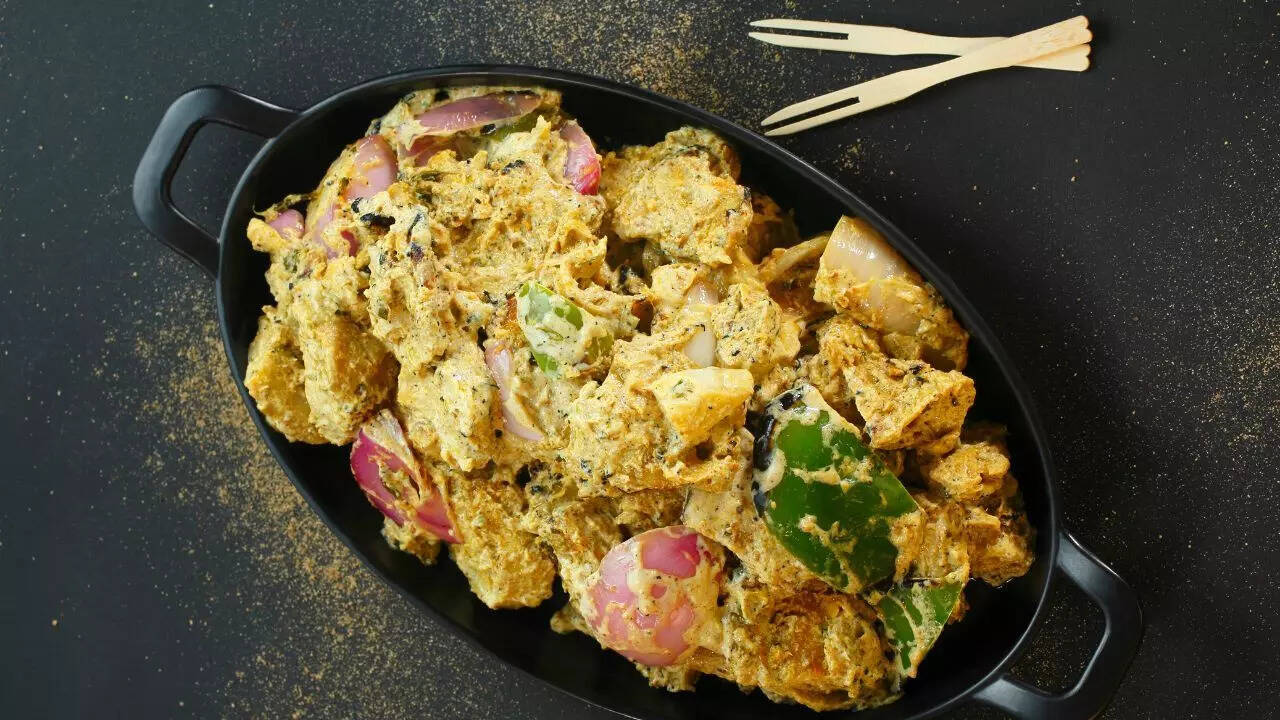Soya chunks could be as unhealthy as junk food, gut health expert reveals | – The Times of India

Soya chunks have been the darling of vegetarian kitchens and fitness plates for years. Crispy, protein-packed, and easy to cook, they seem like the perfect healthy alternative to meat. But gut and hormone health expert Dr. Tanisha Bawa is here to shake that belief. In a recent Instagram post, Dr. Bawa warned that soya chunks and other processed soy products like soya chaap and nuggets might actually be worse than junk food.According to Dr. Bawa, these seemingly wholesome protein bites are often loaded with refined ingredients, contain plant compounds that can disrupt hormonal balance, and include additives that may upset your gut. The post quickly went viral, leaving health-conscious foodies and gym enthusiasts questioning their beloved protein source.Before you toss your next batch of soya chunks into the curry, it is time to rethink your plate. In this article, we uncover the hidden dangers of soya chunks, explore how they can affect your gut and hormones, and suggest healthier, delicious alternatives to keep your meals nourishing, satisfying, and truly beneficial for your body.
What are soya chunks, and why are they popular
Soya chunks are processed soy protein products made by extracting protein from defatted soy flour. They are widely popular in Indian kitchens and vegetarian diets as a meat substitute. While they are rich in protein, the heavy processing and refined ingredients raise concerns. Gut health expert Dr. Bawa warns that the high content of phytoestrogens and chemical additives in soya chunks may affect hormone balance and digestive health if consumed excessively.
Soya chunks health risks for the gut and hormones

Soya chunks and refined ingredients
Dr. Bawa notes that many soya chunk products contain a large proportion of refined flour. Refined carbohydrates can spike blood sugar levels, trigger inflammation, and contribute to weight gain and metabolic issues over time.
Soya chunks and hormonal impact
Soy contains phytoestrogens, plant compounds that mimic estrogen. While moderate amounts may be safe, excessive consumption can interfere with natural hormonal balance. Gut and hormone health expert Dr. Bawa explains that this can affect thyroid function and reproductive health.
Soya chunks and gut health
Processed soya chunks may include additives, preservatives, or chemicals that negatively impact the gut microbiome. A disrupted gut can lead to bloating, indigestion, and reduced nutrient absorption, making even a protein-rich meal less beneficial.
Healthier alternatives to soya chunks

Whole soy foods instead of soya chunks
Opt for minimally processed soy like tofu, tempeh, or edamame. These retain most nutrients, support hormonal balance, and are gentler on the gut, making them far healthier than processed soya chunks.
Legumes and pulses as protein alternatives
Lentils, chickpeas, and beans are excellent plant-based protein sources with high fiber content. They support digestion, satiety, and overall health, making them a smart alternative to processed soy.
Nuts and seeds as soya chunk substitutes
Almonds, flaxseeds, and chia seeds provide protein, healthy fats, and essential micronutrients. These can be added to breakfast bowls, smoothies, or salads for a nutritious boost without compromising gut health.
Whole grains to complement plant protein
Quinoa, brown rice, and oats offer complex carbohydrates and fiber. They promote steady energy, better digestion, and pair well with legumes or soy, creating a balanced and filling meal.
Practical tips for reducing soya chunks in your diet
- Limit processed soy products like soya chunks to occasional use rather than daily consumption.
- Balance your diet with whole foods rich in protein, fiber, and healthy fats.
- Read labels carefully to avoid products with high refined content or artificial additives.
- Consult a nutritionist if you are relying heavily on soy-based protein alternatives.
While soya chunks are convenient and protein-rich, Dr. Tanisha Bawa’s advice highlights the importance of choosing the right type of protein. Excessive consumption of processed soy can harm gut health, disrupt hormones, and mimic the negative effects of junk food. Incorporating whole, minimally processed soy, legumes, nuts, and whole grains ensures you get adequate protein without compromising your health.Next time you reach for soya chunks, remember that not all protein is created equal. Making informed choices can support digestive health, hormonal balance, and overall well-being, keeping you truly nourished rather than just full.Disclaimer: This article is for general informational purposes only and is not a substitute for professional medical advice, diagnosis, or treatment. Always seek the guidance of a qualified healthcare provider regarding any medical condition or lifestyle change.Also read| What happens if you fast for 9 days: Science reveals benefits and risks
var _mfq = window._mfq || [];
_mfq.push([“setVariable”, “toi_titan”, window.location.href]);
!(function(f, b, e, v, n, t, s) {
function loadFBEvents(isFBCampaignActive) {
if (!isFBCampaignActive) {
return;
}
(function(f, b, e, v, n, t, s) {
if (f.fbq) return;
n = f.fbq = function() {
n.callMethod ? n.callMethod(…arguments) : n.queue.push(arguments);
};
if (!f._fbq) f._fbq = n;
n.push = n;
n.loaded = !0;
n.version = ‘2.0’;
n.queue = [];
t = b.createElement(e);
t.async = !0;
t.defer = !0;
t.src = v;
s = b.getElementsByTagName(e)[0];
s.parentNode.insertBefore(t, s);
})(f, b, e, ‘https://connect.facebook.net/en_US/fbevents.js’, n, t, s);
fbq(‘init’, ‘593671331875494’);
fbq(‘track’, ‘PageView’);
};
function loadGtagEvents(isGoogleCampaignActive) {
if (!isGoogleCampaignActive) {
return;
}
var id = document.getElementById(‘toi-plus-google-campaign’);
if (id) {
return;
}
(function(f, b, e, v, n, t, s) {
t = b.createElement(e);
t.async = !0;
t.defer = !0;
t.src = v;
t.id = ‘toi-plus-google-campaign’;
s = b.getElementsByTagName(e)[0];
s.parentNode.insertBefore(t, s);
})(f, b, e, ‘https://www.googletagmanager.com/gtag/js?id=AW-877820074’, n, t, s);
};
function loadSurvicateJs(allowedSurvicateSections = []){
const section = window.location.pathname.split(‘/’)[1]
const isHomePageAllowed = window.location.pathname === ‘/’ && allowedSurvicateSections.includes(‘homepage’)
const ifAllowedOnAllPages = allowedSurvicateSections && allowedSurvicateSections.includes(‘all’);
if(allowedSurvicateSections.includes(section) || isHomePageAllowed || ifAllowedOnAllPages){
(function(w) {
function setAttributes() {
var prime_user_status = window.isPrime ? ‘paid’ : ‘free’ ;
var geoLocation = window?.geoinfo?.CountryCode ? window?.geoinfo?.CountryCode : ‘IN’ ;
w._sva.setVisitorTraits({
toi_user_subscription_status : prime_user_status,
toi_user_geolocation : geoLocation
});
}
if (w._sva && w._sva.setVisitorTraits) {
setAttributes();
} else {
w.addEventListener(“SurvicateReady”, setAttributes);
}
var s = document.createElement(‘script’);
s.src=”https://survey.survicate.com/workspaces/0be6ae9845d14a7c8ff08a7a00bd9b21/web_surveys.js”;
s.async = true;
var e = document.getElementsByTagName(‘script’)[0];
e.parentNode.insertBefore(s, e);
})(window);
}
}
window.TimesApps = window.TimesApps || {};
var TimesApps = window.TimesApps;
TimesApps.toiPlusEvents = function(config) {
var isConfigAvailable = “toiplus_site_settings” in f && “isFBCampaignActive” in f.toiplus_site_settings && “isGoogleCampaignActive” in f.toiplus_site_settings;
var isPrimeUser = window.isPrime;
var isPrimeUserLayout = window.isPrimeUserLayout;
if (isConfigAvailable && !isPrimeUser) {
loadGtagEvents(f.toiplus_site_settings.isGoogleCampaignActive);
loadFBEvents(f.toiplus_site_settings.isFBCampaignActive);
loadSurvicateJs(f.toiplus_site_settings.allowedSurvicateSections);
} else {
var JarvisUrl=”https://jarvis.indiatimes.com/v1/feeds/toi_plus/site_settings/643526e21443833f0c454615?db_env=published”;
window.getFromClient(JarvisUrl, function(config){
if (config) {
const allowedSectionSuricate = (isPrimeUserLayout) ? config?.allowedSurvicatePrimeSections : config?.allowedSurvicateSections
loadGtagEvents(config?.isGoogleCampaignActive);
loadFBEvents(config?.isFBCampaignActive);
loadSurvicateJs(allowedSectionSuricate);
}
})
}
};
})(
window,
document,
‘script’,
);
[title_words_as_hashtags




